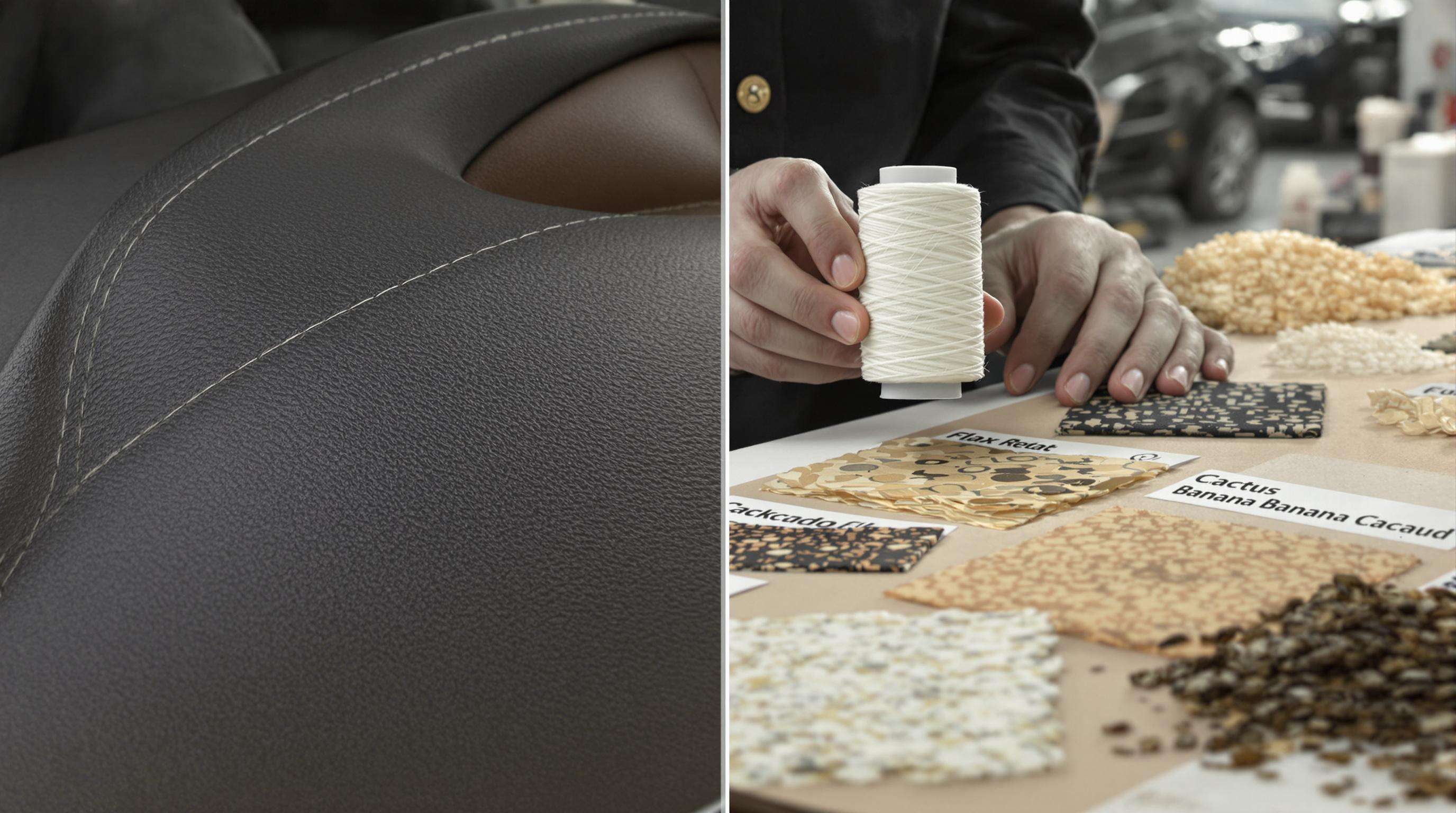These days, drivers see their cars not just as transportation but as part of who they are. About two thirds of people with luxury cars really care about how the inside looks and wants it to match their personal style, says the 2024 Automotive Personalization Report. People want special touches these days, stuff like different colored stitching or custom logos on seats. This has forced many after market shops to invest in fancy computer design systems so they can copy patterns accurately. And folks are willing to pay extra for these touches too. Around 48 out of every 100 car buyers in 2023 spent more money specifically for custom stitching options, according to research from the Material Innovation Consortium.
Manufacturers are increasingly merging green practices with high-end design these days. Take for instance those new thread coatings made from algae which actually stand up better to wear and tear compared to regular polyester by about 12%. According to a recent J.D. Power report from last year, around seven out of ten people think car interiors featuring stitching derived from plants look just as fancy as the old school leather stuff, especially when paired with nice quality hides or microfiber materials. There's also been progress on creating wax treatments from biological sources that help keep fabric threads strong even when temperatures swing wildly between freezing cold at minus 40 degrees Fahrenheit all the way up to hot conditions reaching 185 Fahrenheit (which is roughly minus 40 Celsius to 85 Celsius). This addresses real world problems where fabrics might otherwise break down in harsh weather conditions.
The aftermarket industry has started using these special 3D threading templates that fit specific vehicles, allowing them to get really close to factory standards when it comes to how far apart stitches are spaced (about 1.8 to 2.2mm difference is acceptable) and where seams line up properly. What this means for customers is they can actually match those expensive factory colors pretty well too, think things like the Mercedes-Benz Designo Mystic Red or that fancy BMW Individual Tartufo Brown shade. Some new tech developments in pattern making software have cut down on wasted materials by around 22 percent when producing custom upholstery pieces. Pretty impressive considering they still manage to keep that same tight tension level as original equipment manufacturers do, somewhere between 4.5 and 5.5 Newtons per square millimeter.

Car companies are starting to switch their stitching materials to stuff made from cactus plants, banana stalks, and even seaweed. Tests done last year showed these new materials have about 92% of what regular polyester can handle when it comes to pulling forces. The plant based options work because they contain lignin which helps them stand up to wear and tear. Flax based threads seem especially good at this stuff too since they only split apart around 40% as much as other materials after going through roughly 50 thousand simulated times people sit down in car seats according to research from the Automotive Materials Institute published recently. One big name in the industry is mixing algae with old cotton fabric to make threads that don't break down under sunlight exposure and can handle heat inside cars reaching almost 176 degrees Fahrenheit without needing any chemical treatments.
While conventional nylon threads maintain dominance in high-stress areas like bolster seams, plant-based alternatives excel in environmental performance:
| Metric | Plant-Based Threads | Traditional Polyester |
|---|---|---|
| CO₂ emissions/kg | 1.2 kg | 3.8 kg |
| Water consumption | 18 L/m | 42 L/m |
| Abrasion cycles | 200,000+ | 300,000+ |
Recent studies show pineapple fiber threads achieve comparable seam strength to nylon-6 when used in double-lock stitching configurations (Textile Engineering Journal 2024).
A 36-month fleet trial with 200 taxis using castor oil-based stitching revealed:
The study confirmed bio-stitching’s viability for commercial vehicles averaging 45,000 annual miles (Transportation Materials Consortium 2023).
The auto industry is stuck between two worlds right now. On one side, we have these plant based threads that break down about 78% quicker than synthetic ones when tossed into landfills according to the Ecotextiles Report from last year. But car buyers still want their interiors to last at least a decade without falling apart. Some companies are trying out new approaches though. They're developing enzyme inhibitors that basically put the brakes on decomposition until materials hit around 212 degrees Fahrenheit. Others mix things up with hybrid threads made mostly from organic hemp (about 55%) combined with recycled nylon (the other 45%). There's even talk about smart systems that track how stitches degrade over time so parts can be replaced before they fail completely. These workarounds seem to tackle roughly 86% of what people worry about environmentally, all while keeping up with those tough OEM durability requirements as noted in the Global Automotive Sustainability Index for 2024.
Car manufacturers along with those who work on custom parts have started using plant based threads to get just the right colors for special interior designs without relying on synthetics. These high quality eco friendly threads stay stable under UV light exposure even when there are over 500 different color options available. Most people looking to personalize their luxury vehicles find these options cover around 8 out of 10 common requests they come across during private customization jobs. According to findings from the latest Textile Innovation Report released in 2024, switching to bio based polyester actually cuts down factory emissions by about one third compared to regular methods. What's interesting is that these new materials last just as long as conventional ones in real world testing conditions where seats need to withstand years of wear and tear.
Many top manufacturers are starting to mix chrome-free tanning methods with supply chains that follow EUDR regulations. They're getting rid of hexavalent chromium on leather surfaces at the same time as making sure their materials don't come from areas where forests have been cut down. Some interesting developments are happening too with plant-based tanning treatments using extracts from olive leaves. These actually stand up pretty well against wear and tear compared to traditional chrome treatments when tested according to SAE J4001 standards, lasting over 35,000 rub cycles. For custom shops trying to keep up with these ever-changing environmental, social and governance requirements around the world, this represents a real breakthrough. They can still deliver products that meet original equipment manufacturer quality standards while working within stricter sustainability guidelines.
Since 2022, there's been quite a jump in people wanting original equipment specification vegan materials for their cars, about 72% more than before. These materials look similar to what comes standard in newer vehicles that have eco-friendly interiors. High end car manufacturers have started using alternatives made from mushrooms instead of traditional Alcantara, and this trend has caught on pretty well. Now around nine out of ten luxury car custom jobs involve asking for these greener options. For car owners looking to refresh old interiors, getting something close to factory quality makes sense both aesthetically and financially. Plus, when proper records are kept about where the materials came from, it helps preserve the car's resale value down the road.

Car manufacturers are starting to use plant based fabrics including hemp mixes and recycled plastic bottles for parts people actually touch inside vehicles, like doors and the middle console area. The good news is these eco friendly options hold up just as well as regular synthetic materials but they cut down on our dependence on oil products. According to some industry data from last year, there's been pretty impressive growth in these natural materials for car interiors over the past couple years. We're talking around 19% annual increase since 2022. What's making this possible? Better technology with cellulosic textiles that don't fade easily or wear out so fast. Makes sense really when gas prices keep going up and environmental concerns become harder to ignore.
Independent research shows bio-based materials cut manufacturing emissions somewhere between 34 and 48 percent when compared to regular polyester and nylon fabrics. The catch comes at the end of their life cycle though. Plant based fibers break down about 78 percent quicker in industrial composts, but they stick around just as long as synthetic materials do in landfills. For car manufacturers trying to walk the talk on green initiatives, this mixed bag presents some serious headaches. They need to match their eco friendly marketing with what actually happens after consumers toss out those supposedly sustainable seat covers or dash mats.
74% of luxury vehicle buyers under age 40 prioritize interiors with certified eco-materials, yet 63% express skepticism about durability claims. Successful OEM strategies address this gap through transparent certifications like Cradle-to-Cradle Platinum and in-dealership material lifecycle displays. Notably, vehicles combining plant-based stitching with OE-grade colorfastness testing see 22% faster resale turnover.
There's still no real standard for what counts as "biodegradable," which is why seven big car companies got warned by the FTC back in 2023 about making sustainability claims that were just too good to be true. Experts in the field keep saying we need independent checks on certain numbers if we want genuine progress. The main things they look at are how much renewable stuff goes into making these materials (aiming for over 85% seems right) and those volatile organic compounds that get released when everything breaks down. Smart companies aren't just talking about going green anymore. They actually mix in plant based parts and track their supply chains using blockchain technology. People tend to trust them more because of this approach. Some recent tests where participants didn't know which brand they were looking at showed trust levels went up around 41% for brands doing things properly.
Car customization specialists are increasingly turning to sophisticated digital templating tech to get that genuine OEM feel when doing eco-friendly custom work on vehicles. These systems can read factory seat designs with incredible accuracy, sometimes as precise as 0.2mm, which makes it possible to create custom interior fabrics using stitching made from plants rather than synthetic materials. What's really exciting is the new stuff happening with biodegradable thread coatings. They let mechanics adjust the tightness just right so everything fits like it came straight from the assembly line. This matters a lot because according to the Automotive Customization Trends Report for 2024, around 8 out of 10 people buying high-end cars want their aftermarket changes to look and feel exactly like factory installed parts.
Car makers are starting to sell special threading kits made specifically for certain vehicles these days. Think things like those fancy Porsche 911 seat bolsters or the extra seating in the back of a Rivian R1S. The cool part is how these kits work their magic. They have this smart design system that changes how close together the stitches are spaced out between 6 and 12 per inch depending on what kind of surface they're going on and how thick the material is. When it comes to BMW M Series cars though, there's something extra special happening. The threads used here come from castor oil instead of regular stuff. These get tested under UV lights for over 1,500 hours just to make sure they stand up to whatever weather throws at them. And guess what? Tests show these threads last about 40% longer than normal polyester ones when sitting in direct sunlight inside the car.
This precision engineering enables customizers to recreate OEM-style contrast stitching in Mercedes-AMG patterns or Tesla Yoke steering wheel wraps using entirely plant-derived materials, achieving <1% color variance compared to factory dye lots.
Key trends include the integration of unique custom touches such as colored stitching and logos, a greater emphasis on using eco-friendly materials, and a demand for OEM-like fit and finish.
Eco-friendly materials such as plant-based threads are shown to perform comparably to traditional materials, offering similar strength and durability while also reducing environmental impact.
Yes, plant-based threads are designed to be durable and perform well against wear and tear, comparable to traditional polyester and nylon while being more environmentally sustainable.

Copyright © 2024 Shenzer Automobile - Privacy policy